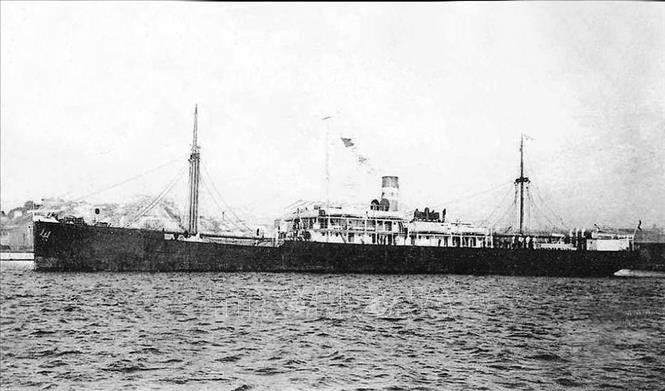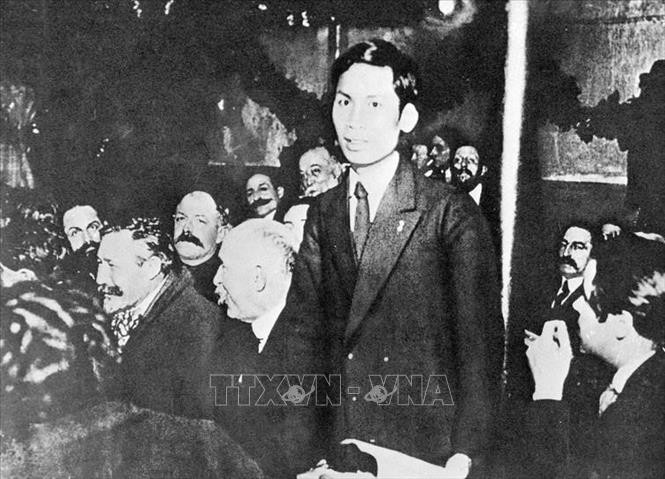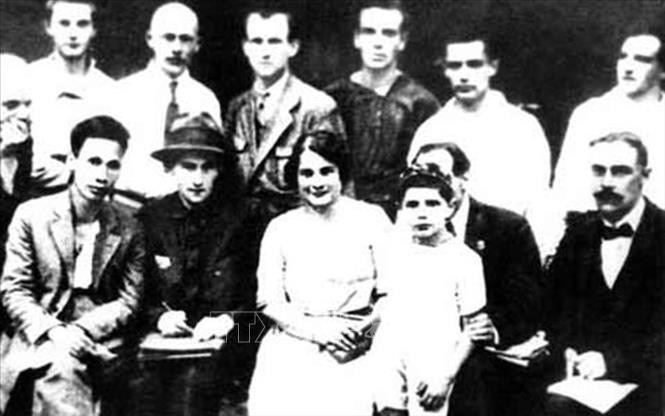(VOVWORLD) - 110 years ago, on June 5, a young man named Nguyen Tat Thanh, who later became President Ho Chi Minh, left Vietnam from Nha Rong harbor in Ho Chi Minh City on a French ship, beginning a 30-year journey to find a path to national salvation for Vietnam. The path he chose through national liberation to socialism has faithfully guided Vietnam’s development.
 On June 5, 1911, from Nha Rong harbor of Saigon port, young patriot Nguyen Tat Thanh left Vietnam and departed on the Admiral Latouche-Tréville ship to fulfill his ambition to liberate the country from slavery. Photo: VNA archives On June 5, 1911, from Nha Rong harbor of Saigon port, young patriot Nguyen Tat Thanh left Vietnam and departed on the Admiral Latouche-Tréville ship to fulfill his ambition to liberate the country from slavery. Photo: VNA archives |
Witnessing the brutal exploitation of the French colonialists and their feudal henchmen and the suffering of Vietnam’s working people, Ho Chi Minh nurtured a strong desire to liberate Vietnam with an independent and creative vision different from his predecessors. He decided to go abroad to seek a way to gain independence for his nation, and freedom and happiness for his people.
Associate Professor Dr. Ly Viet Quang, Director of the Institute of Ho Chi Minh and Party Leaders, said that Lenin's Thesis on National and Colonial Questions inspired in Ho Chi Minh the idea of a proletarian revolutionary path to the realization of national independence and socialism in Vietnam.
“Before Uncle Ho read Lenin's thesis, he was uncertain which path the Vietnamese people should take. Reading the thesis, he realized that this was what he had been looking for. The thesis convinced him that the path the Vietnamese nation should follow was the path of national liberation combined with class and human liberation, national independence, and socialism,” Quang said.
 From December 25 to 30, 1920, Nguyen Ai Quoc attended the 18th Congress of the French Socialist Party in Tours city as a delegate from Indochina. Photo: VNA archives From December 25 to 30, 1920, Nguyen Ai Quoc attended the 18th Congress of the French Socialist Party in Tours city as a delegate from Indochina. Photo: VNA archives
|
In 1941, at the end of his 30-year journey seeking a path to national salvation, Ho Chi Minh fulfilled his goal of being the one to lead the way, awaken the masses, and unite them to fight for national independence. When the time came, he led the successful 1945 August Revolution, an event that changed the destiny of the nation. In the early days of independent Vietnam, President Ho Chi Minh expressed a consistent view that the Government must take care of the people. He identified four things that were needed immediately: food, clothing, housing, and education.
Associate Professor Dr. Chu Duc Tinh, former Director of Ho Chi Minh Museum, said, “Uncle Ho explained very simply to the Government in 1945 and 1946 that without the people, the Government has no power, and without the Government, the people have no one to lead the way. So government officials must rely on the people. Uncle Ho taught the cadres the motto ‘What is beneficial to our people we must do to the best of our ability. What is harmful to our people we must avoid.’ In the end, people’s belief in the leadership is measured by how much they enjoy their lives."
 Nguyen Ai Quoc (first left, front row) and delegates to the 5th Congress of the Communist International in Moscow, from June 17 to July 8, 1924. Photo: VNA archives Nguyen Ai Quoc (first left, front row) and delegates to the 5th Congress of the Communist International in Moscow, from June 17 to July 8, 1924. Photo: VNA archives
|
When northern Vietnam entered the socialism construction period and became the solid rear supporting the Southern frontline in the resistance war against the US, President Ho Chi Minh said that taking care of people’s lives and happiness was one of the most important socialist goals the Party and State of Vietnam were aiming at. According to him, socialism constantly improves peoples’ lives, particularly the lives of working people, materially and spiritually.
Professor Dr. Mach Quang Thang, senior lecturer at the Institute of Party History, Ho Chi Minh National Academy of Politics, said, “President Ho Chi Minh conceived of socialism as a society in which there is no human exploitation. Socialism gives everyone a prosperous, free, and happy life – both a full material life and a rich spiritual life. Socialism, in Ho Chi Minh's view, is a society owned by the people and their compatriots.”
In accordance with his wishes, the 1991 Party Platform on building Vietnam during the transition period to socialism affirmed that the Party and the people would continue to steadfastly pursue national independence and socialism. The 2011 version of the 1991 Platform is an ideological banner guiding the Party to lead the nation through the renewal process toward the goal of becoming "a prosperous people living in a strong, democratic, just, and civilized country."
Associate Professor Dr. Bui Dinh Phong of the Ho Chi Minh National Academy of Politics said the path chosen by the Party, above all, must bring to all citizens a richer and more beautiful life.
“We are building socialism and this cause belongs to the people, is by the people and for the people. It can be said that this is a great achievement. Of course, there are things we haven’t achieved as fully as we would like, because we’re still in a transition period when old and new, bad and good are intertwined. It’s a long, arduous struggle, but we must aim to defeat all evil and backwardness eventually," Phong said.
Socialism was the right choice by President Ho Chi Minh and the Communist Party of Vietnam, well matched to the evolution of history. The choice made by President Ho Chi Minh has become the aspiration of the Vietnamese people because it’s a choice that makes people richer and their lives better and will inevitably create a prosperous, democratic, just, and civilized society.